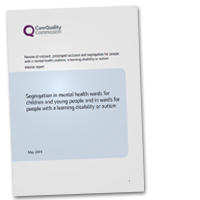This report gives the interim findings from our review of the use of restrictive interventions in places that provide care for people with mental health problems, a learning disability and/or autism.

Overview
At the end of 2018, Matt Hancock, the Secretary of State for Health and Social Care, asked us to look at the use of restrictive interventions.
This interim report focuses on 39 people who are cared for in segregation on a learning disability ward or a mental health ward for children and young people.
What we did
This report shares findings from our visits to 35 wards where we assessed the care of 39 people.
The report also uses information gathered from a request sent to 92 registered providers of services for people with a mental health problem, a learning disability and or autism.
Our preliminary findings
What we found on our visits:
- Many people we visited had been communicating their distress and needs in a way that people may find challenging since childhood, and services were unable to meet their needs.
- A high proportion of people in segregation had autism.
- Some of the wards did not have a built environment that was suitable for people with autism.
- Many staff lacked the necessary training and skills.
- Several people that we have visited were not receiving high quality care and treatment.
- In the case of 26 of the 39 people, staff had stopped attempting to reintegrate them back onto the main ward. This was usually because of concerns about violence and aggression.
- Some people were experiencing delayed discharge from hospital, and so prolonged time in segregation, due to there being no suitable package of care available in a non-hospital setting.
The interim report focuses exclusively on the experience of those people cared for in segregation on a mental health ward for children and young people or on a ward for people with a learning disability or autism. It makes a number of recommendations for the health and care system, including CQC.
Next steps
In the next phase of the review, we will look at the use of restrictive practices in a wider group of settings, including low secure and rehabilitation mental health wards and adult social care services.
We will work with Ofsted to consider the use of restrictive intervention in children’s residential services and secure children’s homes.
We will make further recommendations to the Department of Health and Social Care and the wider system in our March 2020 report.
Download
Interim report: Review of restraint, seclusion and segregation
Interim report: Review of restraint, seclusion and segregation – Easy read
Join the conversation
Follow #CQCRestraintReview on Twitter
Related information
Press release: CQC calls for action to fix the closed system that leads to people with a learning disability or autism being segregated in hospital
Thematic review: Our review of restraint, seclusion and segregation